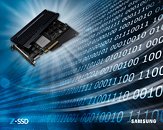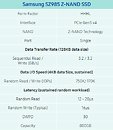Raevenlord
News Editor
- Joined
- Aug 12, 2016
- Messages
- 3,755 (1.15/day)
- Location
- Portugal
| System Name | The Ryzening |
|---|---|
| Processor | AMD Ryzen 9 5900X |
| Motherboard | MSI X570 MAG TOMAHAWK |
| Cooling | Lian Li Galahad 360mm AIO |
| Memory | 32 GB G.Skill Trident Z F4-3733 (4x 8 GB) |
| Video Card(s) | Gigabyte RTX 3070 Ti |
| Storage | Boot: Transcend MTE220S 2TB, Kintson A2000 1TB, Seagate Firewolf Pro 14 TB |
| Display(s) | Acer Nitro VG270UP (1440p 144 Hz IPS) |
| Case | Lian Li O11DX Dynamic White |
| Audio Device(s) | iFi Audio Zen DAC |
| Power Supply | Seasonic Focus+ 750 W |
| Mouse | Cooler Master Masterkeys Lite L |
| Keyboard | Cooler Master Masterkeys Lite L |
| Software | Windows 10 x64 |
As big data usage is becoming ubiquitous, and workload data-sets increase in both size and complexity, new ways of connecting processing resources to storage are being developed. Intel and Micron's partnership in developing 3D XPoint memory came as a way for computer systems to reduce their bottlenecks in storing data for processing, with a particular emphasis on reducing latency. Samsung, however, has enough resources to try and provide alternatives for the emergent market needs, and being one of the most important players in the NAND industry, it seems the company is betting on the Z-NAND wagon.
For now, Z-NAND as it is being developed by Samsung, is expected to be a new rendition of SLC (Single-Level Cell) NAND, with increased controller tweaks and improvements to achieve greater IOPS in both random and sequential workloads. SLC has already been widely used in the SSD market, though in recent years it has been giving way to density-oriented technologies, such as MLC and, more recently, TLC NAND, in an effort to lower the $/GB equation. Z-NAND is a return to the SLC roots, with some very relevant tricks up its sleeve - while 3D XPoint's call to fame was sometimes up to 10x lower latency (in the order of 10/10μs), Z-NAND is also bringing latency to levels hitherto unknown to NAND memory - specifically, to the 12-20/16μs realms.


Comparing Intel's 750 GB Optane P4800X with Samsung's upcoming 800GB, SZ985, Z-NAND based solution, Samsung's drive delivers higher random read IOPS than Intel's Optane (750K vs 550K), but falls short on write IOPS (175K vs the same 550K for Optane). R/W bandwidth, however, seems to be in Z-NAND's favor: it delivers 3.2 GB/s in both metrics, while the Optane P4800X makes do with 2.4 GB/s and 2 GB/s, respectively, while endurance between both technologies should be equivalent.
View at TechPowerUp Main Site
For now, Z-NAND as it is being developed by Samsung, is expected to be a new rendition of SLC (Single-Level Cell) NAND, with increased controller tweaks and improvements to achieve greater IOPS in both random and sequential workloads. SLC has already been widely used in the SSD market, though in recent years it has been giving way to density-oriented technologies, such as MLC and, more recently, TLC NAND, in an effort to lower the $/GB equation. Z-NAND is a return to the SLC roots, with some very relevant tricks up its sleeve - while 3D XPoint's call to fame was sometimes up to 10x lower latency (in the order of 10/10μs), Z-NAND is also bringing latency to levels hitherto unknown to NAND memory - specifically, to the 12-20/16μs realms.


Comparing Intel's 750 GB Optane P4800X with Samsung's upcoming 800GB, SZ985, Z-NAND based solution, Samsung's drive delivers higher random read IOPS than Intel's Optane (750K vs 550K), but falls short on write IOPS (175K vs the same 550K for Optane). R/W bandwidth, however, seems to be in Z-NAND's favor: it delivers 3.2 GB/s in both metrics, while the Optane P4800X makes do with 2.4 GB/s and 2 GB/s, respectively, while endurance between both technologies should be equivalent.
View at TechPowerUp Main Site










